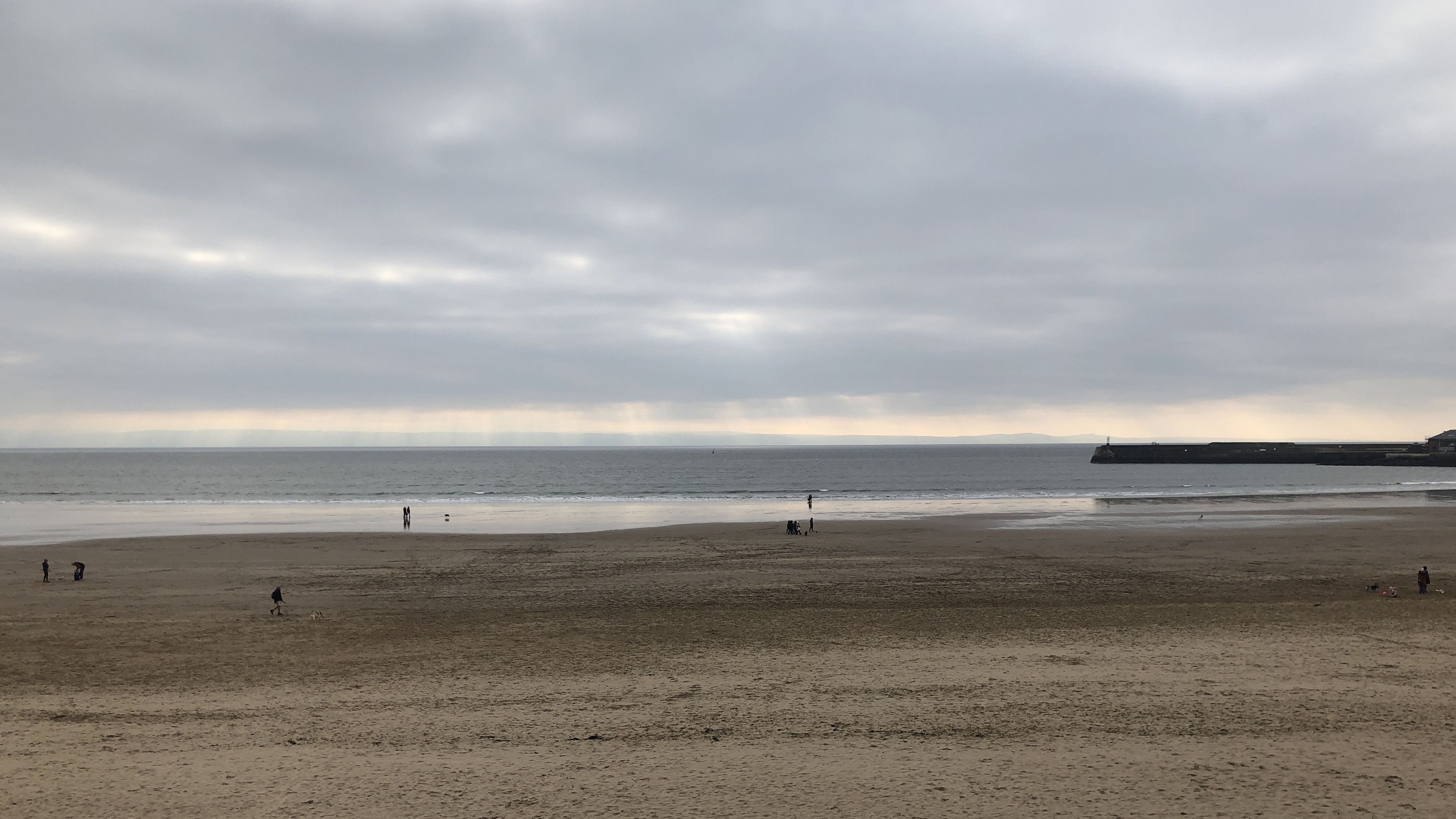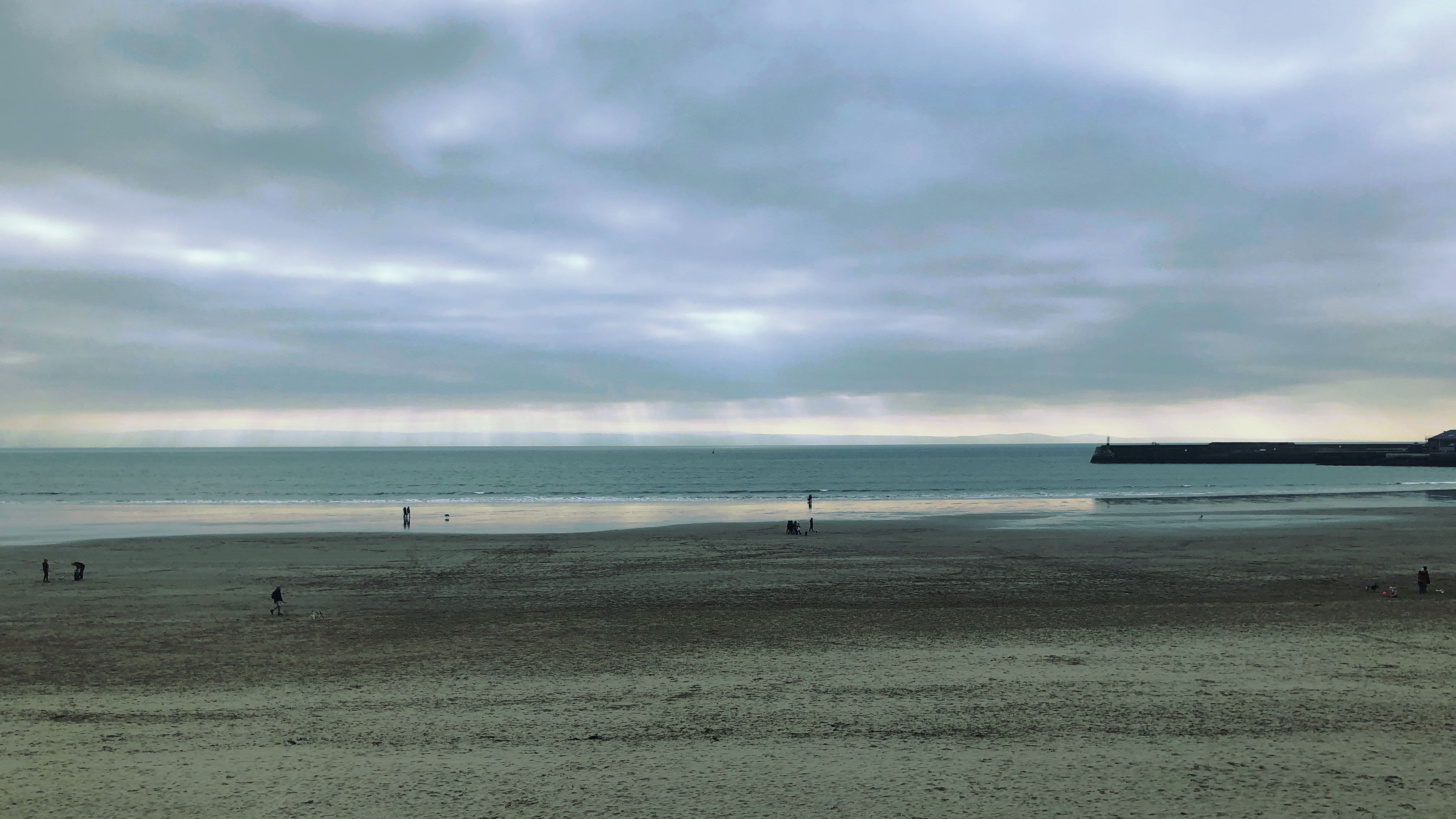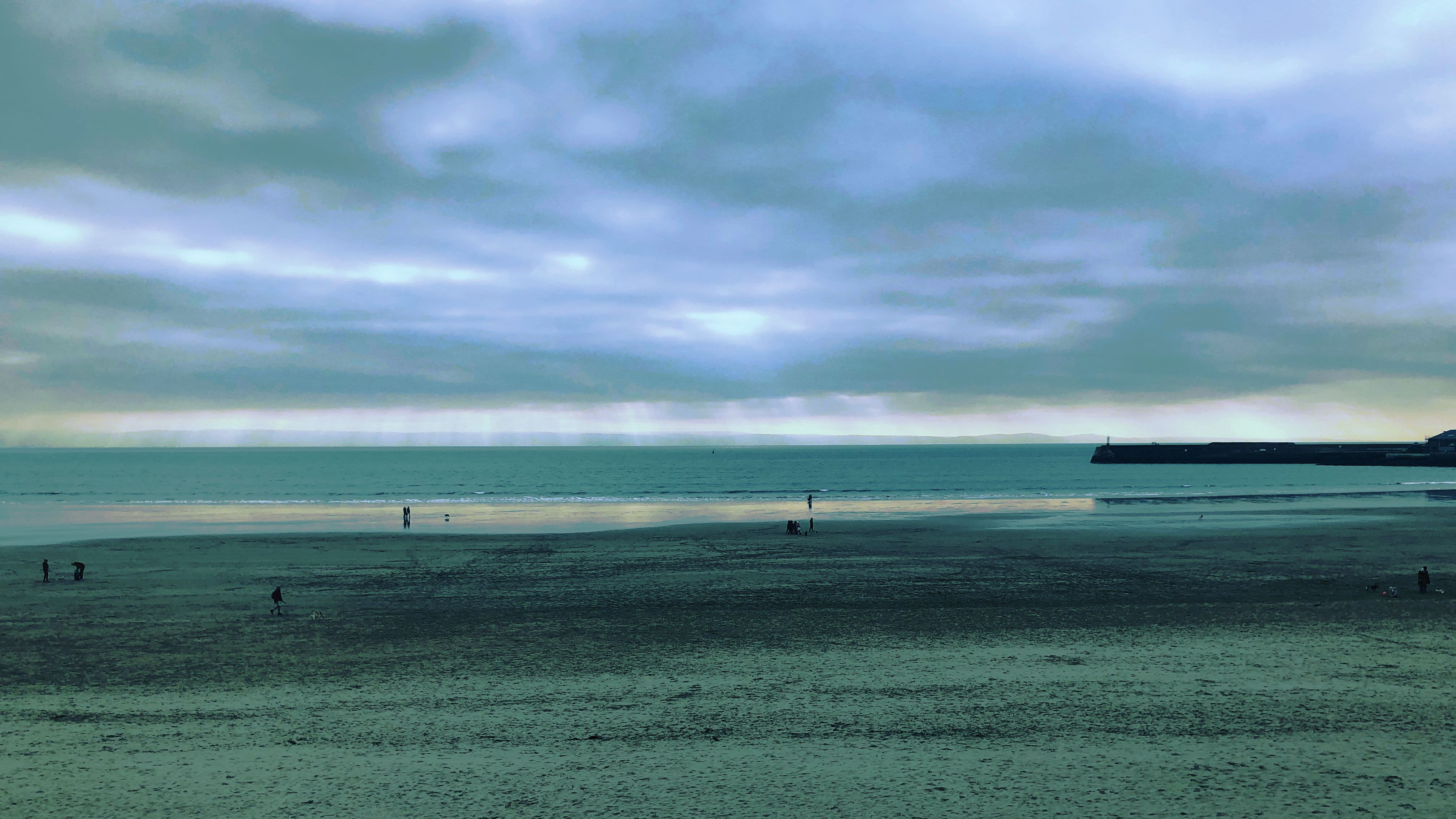Clean beach, clear mind
Ahead of the nation’s biggest litter-picking campaign this spring, I joined a beach cleanup to see if helping the environment can also help my wellbeing

It’s a cold Sunday morning in February, and the freezing sea breeze hits my face as I spot a group donning hi-vis vests. They are congregating by a black flag with a Jolly Roger design. I assume this must be the team and approach them.
“Are you here for the beach clean?” asks a man with sunglasses, smiling at me.
I nod.
“Great,” he says, and hands me a reflective vest, a bag, and a litter picker.
This is my first ever beach clean, a fact that still surprises me as I’ve always hated litter and love the environment. Ever since I saw that heart-breaking viral photograph of a tiny seahorse clinging to a pink plastic cotton swab, I’ve wanted to do my bit to stop plastic polluting our seas and oceans. But, like many things in life, I put it off.
However, with the Great British Spring Clean, the nation’s biggest mass-action environmental campaign, going ahead from 17 March to 2 April, I have finally decided to take some action – but not just for the environment’s sake.
In the past three years, our outdoor spaces have become a lifeline for many in the UK. Lockdowns have meant that people have found solace in a stroll through a forest or a trip to the seaside, with mental health charity Mind Cymru promoting time spent in nature to improve mental wellbeing.
As well as spending some recreational time outdoors, volunteering in nature also has its benefits. In 2017, a study by the University of Essex found that volunteers on wildlife projects experienced a mental health boost, with two-thirds of all participants noticing improved well-being within six weeks.
To find out first-hand whether volunteering in nature really is a mood booster, I began searching for the nearest wildlife projects that were conducive to my schedule. Throughout my research, one project stood out to me: a beach cleanup run by Sea Shepherd UK at Coney Beach in Porthcawl, south Wales– a seaside town that I visited a lot as a child.
They appeared to organise cleanups every other Sunday, which was perfect for me. A day before travelling to Coney Beach, I contacted Sea Shepherd’s regional co-ordinator for south Wales, Mike “Elkz” Ellams, to let him know of my little mission. Along with welcoming me to the team and reminding me to bring my own gloves, he showed an immense enthusiasm for the subject of mental health. “That’s a great topic,” he told me, a day before the cleanup. “I know myself that it’s therapeutic.”
But will it work for me?
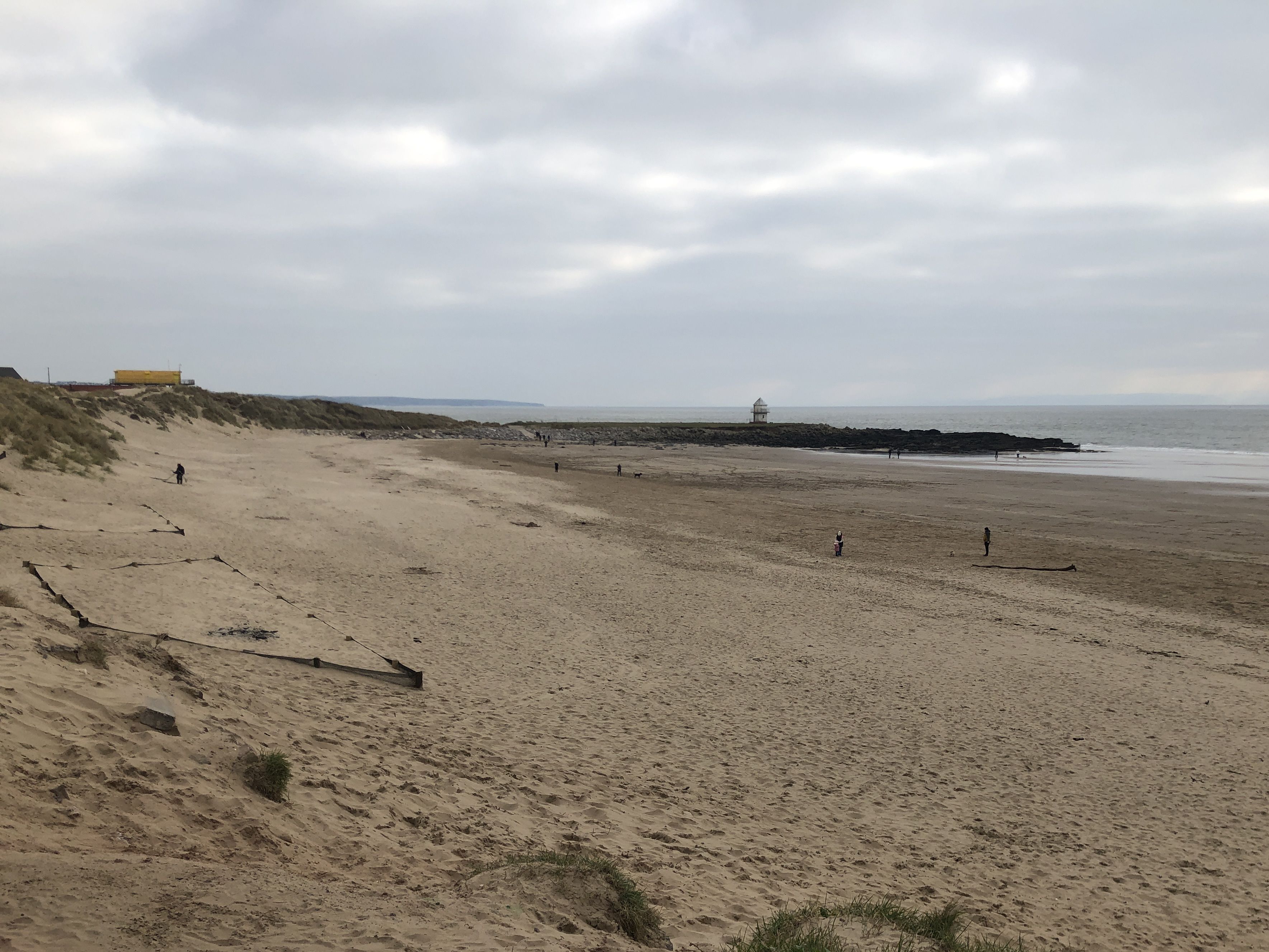
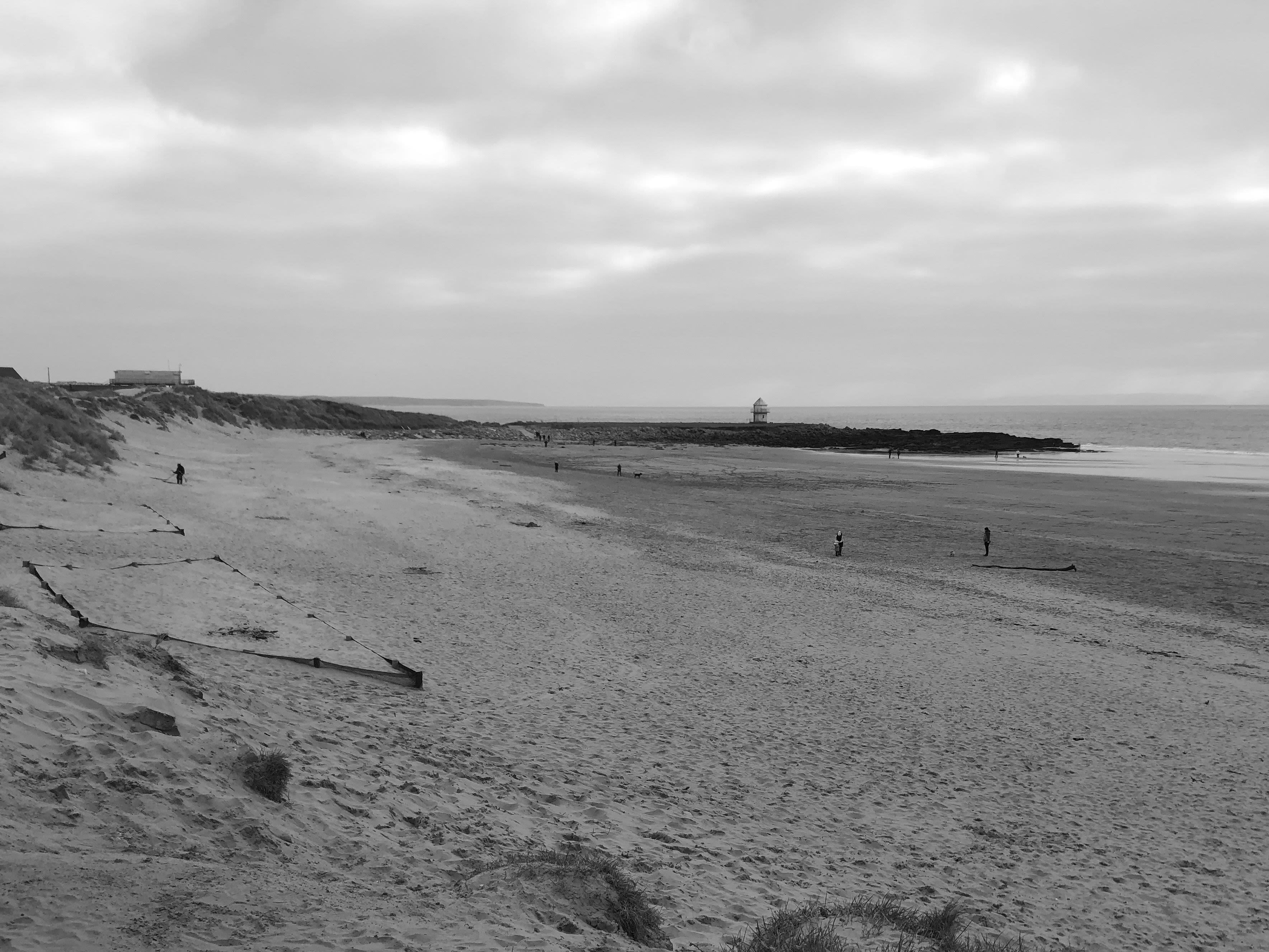
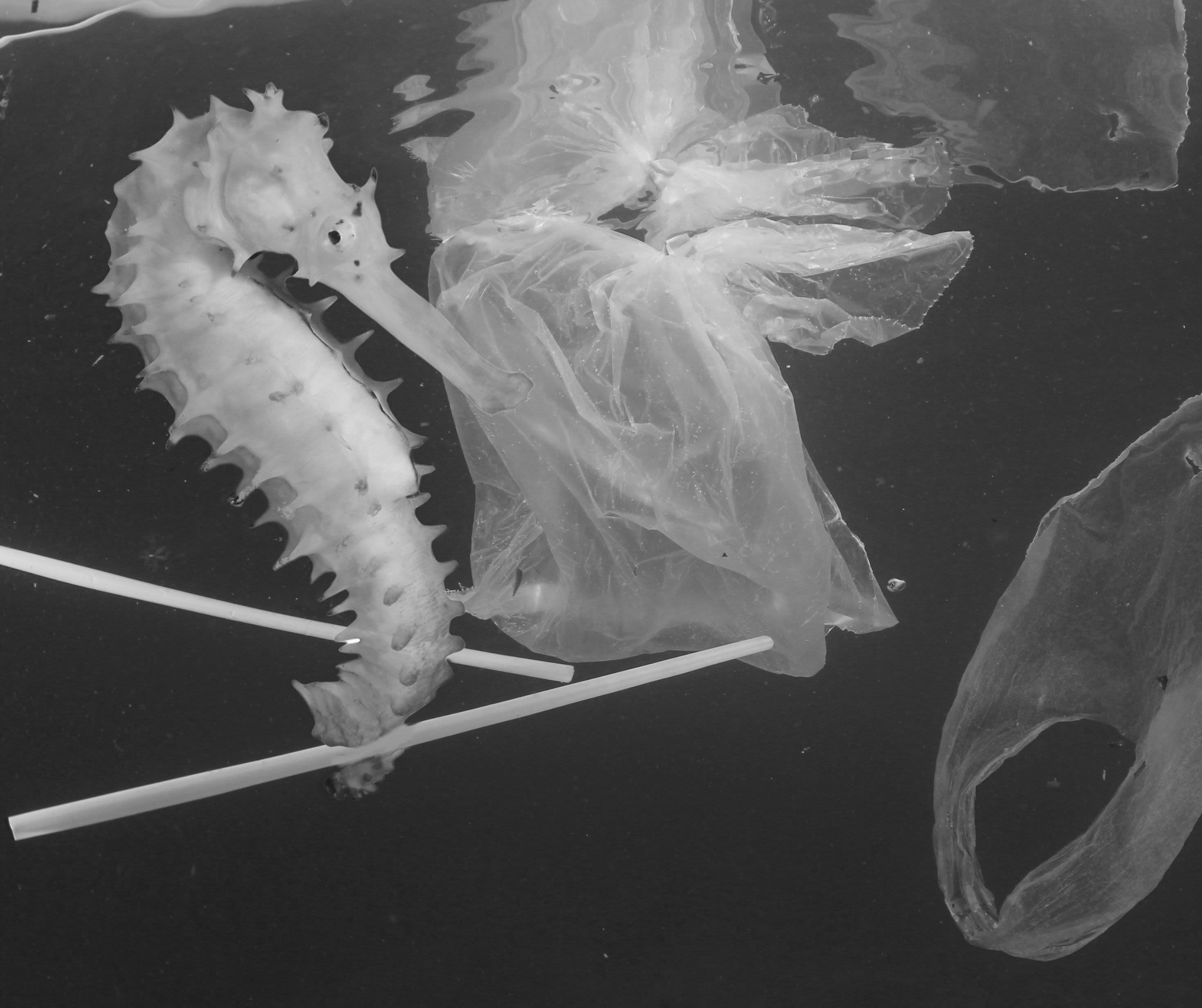
“You’re going to have a great time”
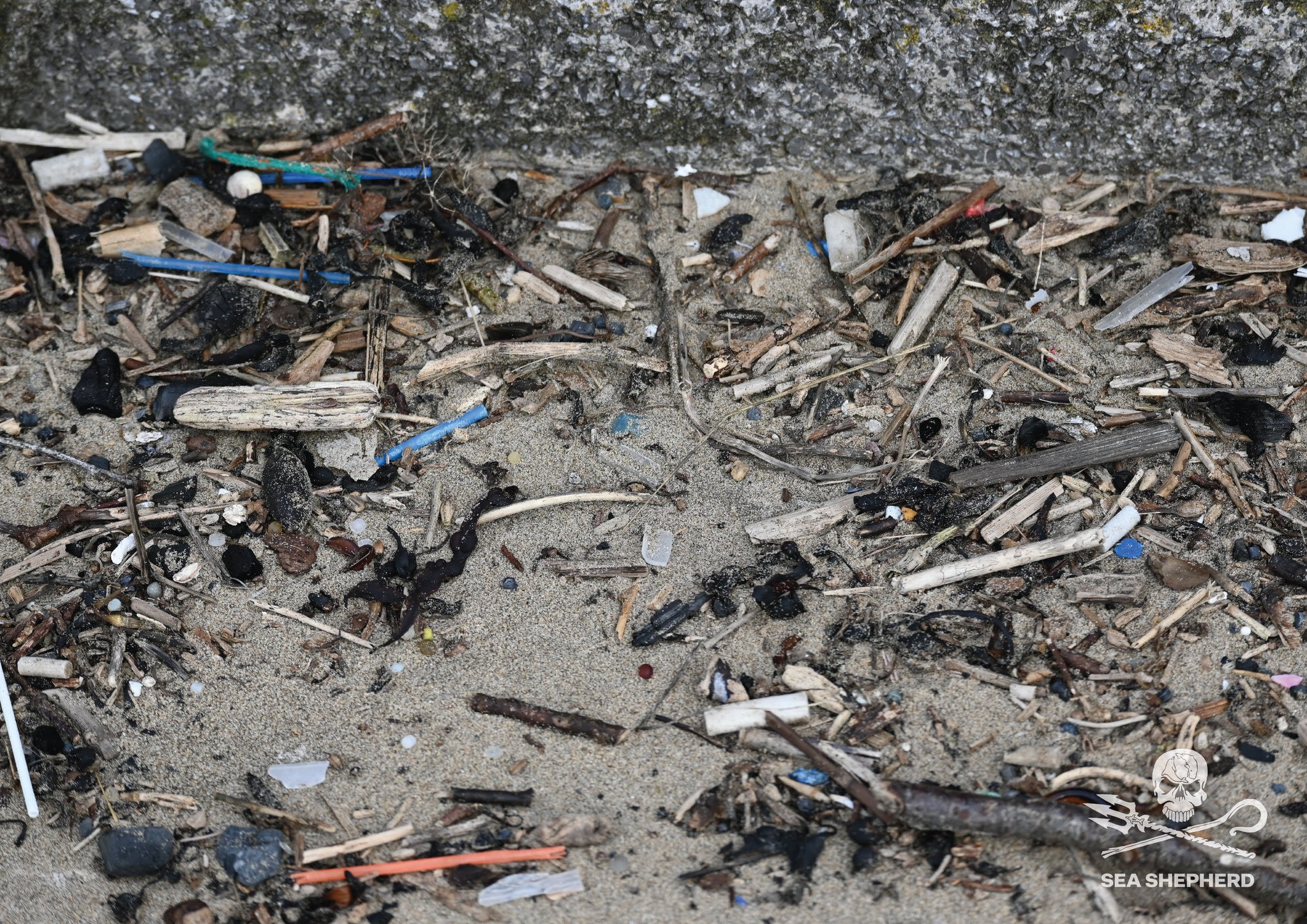
I put my neon yellow vest over my raincoat – which I am rapidly regretting choosing over my cosy puffer jacket – and decide to get to know some of the other volunteers.
I introduce myself to Pam Jones, a bubbly 68-year-old volunteer from Neath. It’s her third time participating in the beach cleanup with Sea Shepherd, and she is eager to get started. I ask her why she has decided to come back.
“It’s therapy for our souls,” she gushes. “You clean up the environment, get exercise, walk on the beach – what more could you want?”
Her equally friendly husband, Lyn Jones, is just as enthusiastic as his wife. “You’re going to have a great time,” the 77-year-old assures me.
“You clean up the environment, get exercise, walk on the beach – what more could you want?”
Before we begin, the man with the sunglasses – who I now know to be Elkz – gives us a briefing. First of all, he reminds us that we are only picking up man-made objects. (Pam tells me that she was so enthusiastic during her first cleanup that she was collecting driftwood as litter.) He also tells us there is a first-aid kit on hand and that we should let him know if we find any dead birds.
But what really captures my interest is when he holds up a clear Tupperware container filled with what looks like seaweed. “If you find any of these egg cases,” he says, tapping the container. “Let me know so I can photograph them and send them to Shark Trust.”
He then points out the parameters of the cleanup, and we all set out to the beach.
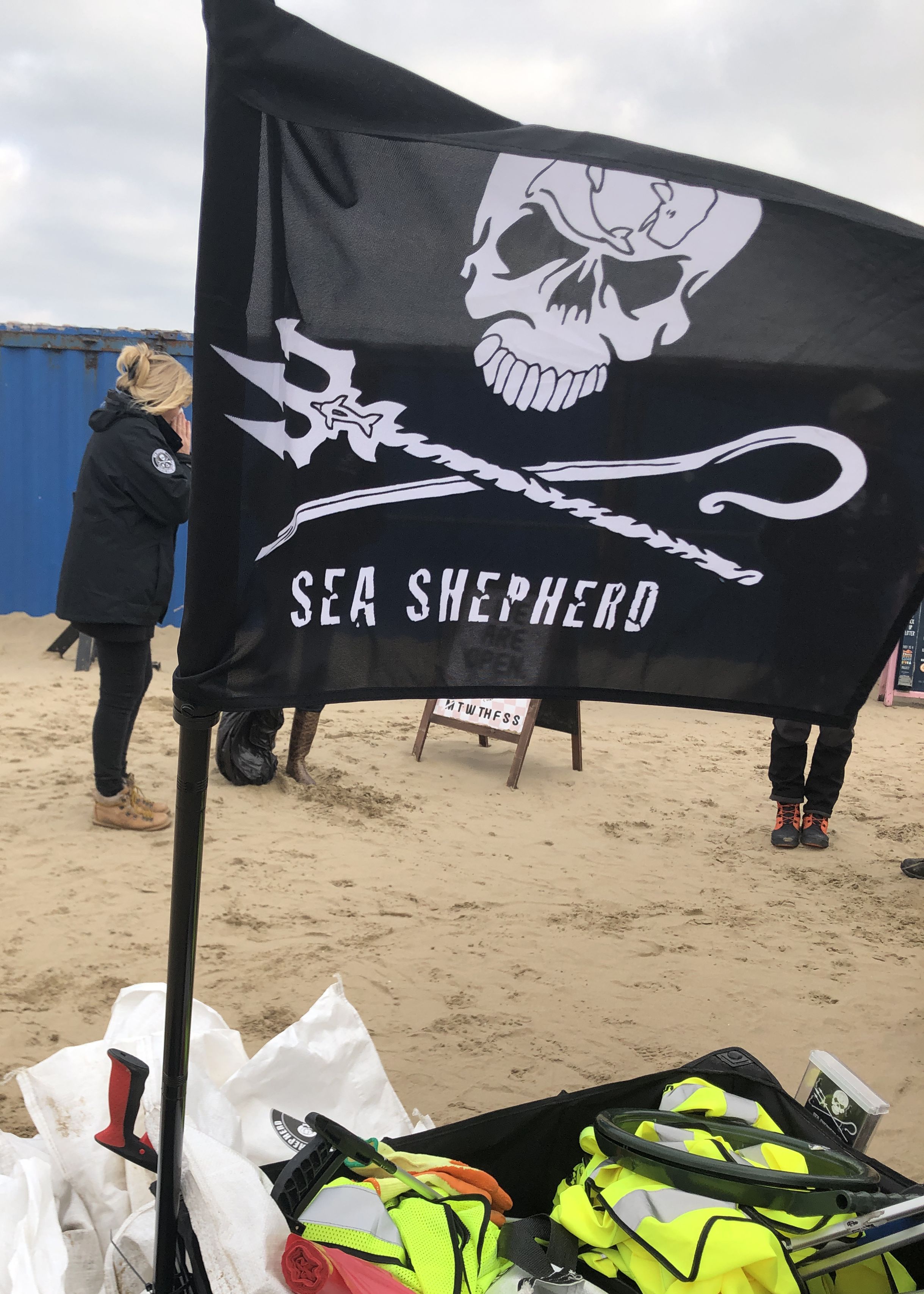
Sea Shepherd's trademark flag marking the meet-up point.
Sea Shepherd's trademark flag marking the meet-up point.
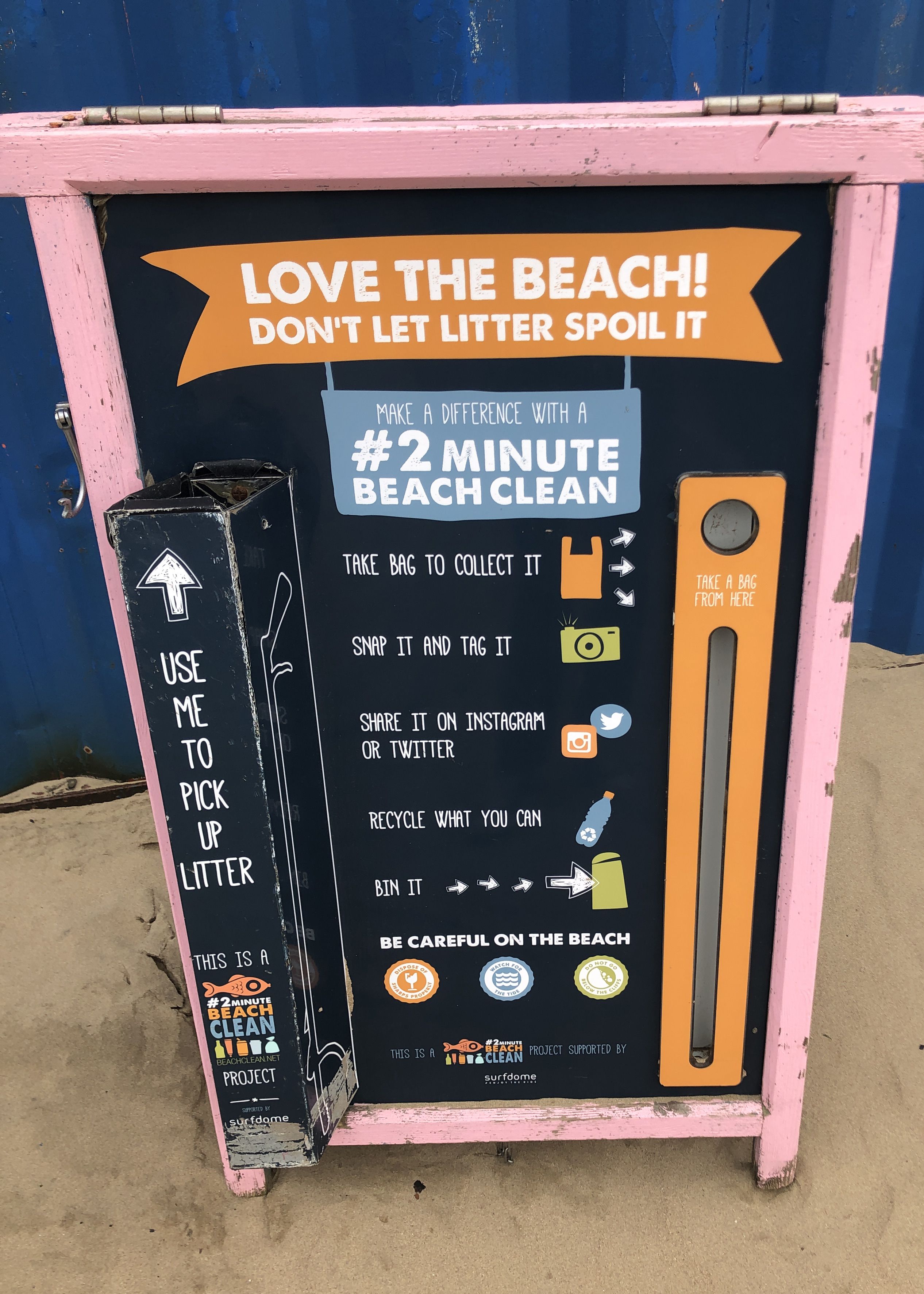
The 2 Minute Foundation sandwich board encouraging beachgoers in Porthcawl to participate in a two-minute beach clean
The 2 Minute Foundation sandwich board encouraging beachgoers in Porthcawl to participate in a two-minute beach clean
The hunt is on
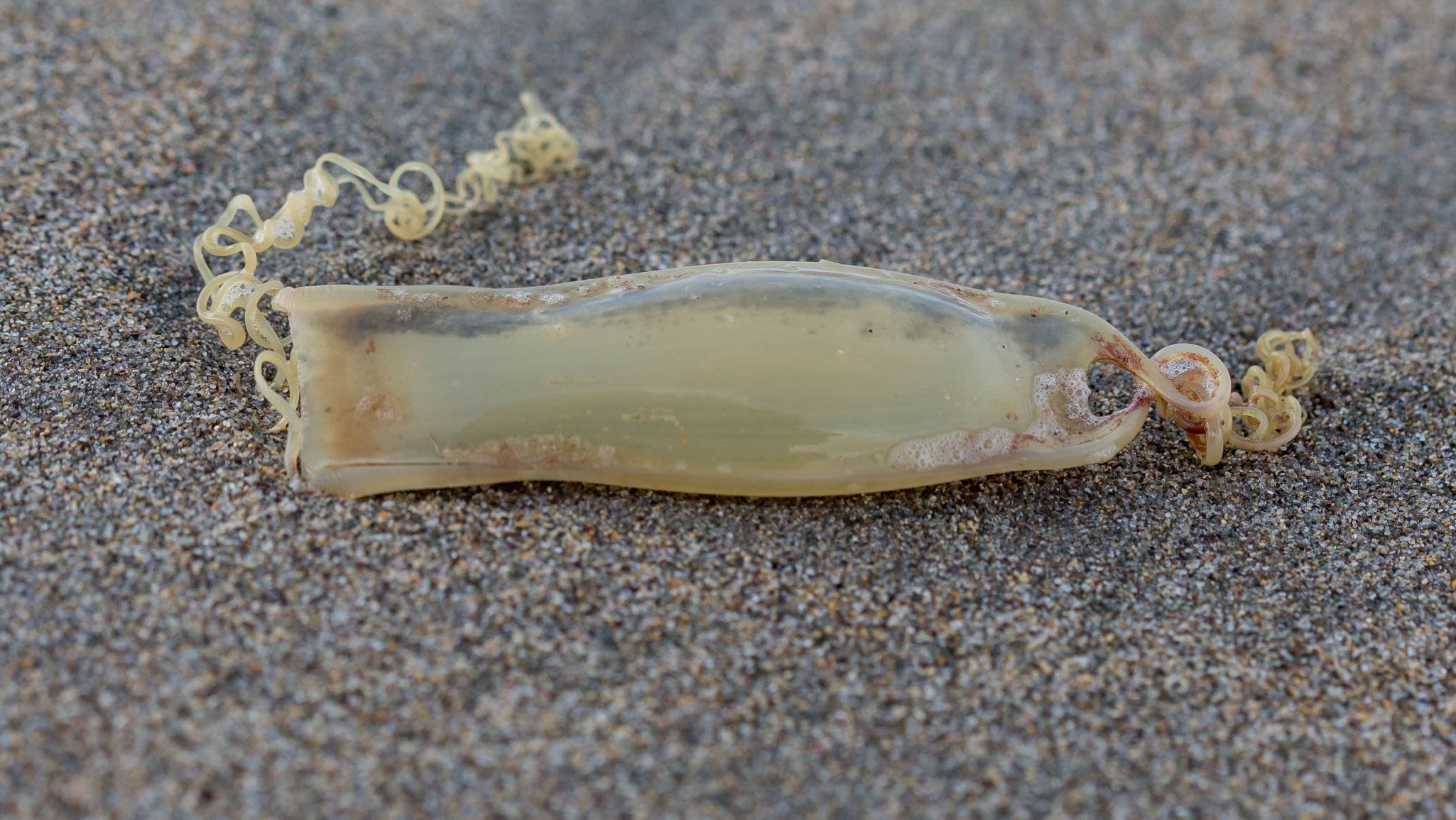
As I shamble down the dunes and onto Coney Beach, I’m surprised to find myself feeling excited. The beach has a healthy smattering of people – couples, young families, dog walkers – and some of them are brave enough to take a dip in the freezing sea.
I look around and see that all my fellow volunteers have spread out, neon vests peppering the beach, and have already got stuck in. I put my head down and begin scanning the beach floor for rubbish.
Before arriving in Porthcawl, the type of rubbish I had been expecting to find were bright crisp packets, fizzy drink cans, and plastic shopping bags. What I find, however, is much less noticeable and far more insidious: tiny shards of plastic – so broken I can’t identify what they had been in their former life – plastic bottle lids, and many, many plastic lollipop sticks.
They are scattered among ordinary, natural beach debris, and completely undetectable by beachgoers who aren’t staring at the ground with litter grabber in hand. I make a promise to myself that no matter how small the litter is, I will make every effort to pick it up.
As I keep my head down and search the sand for pieces of plastic, a funny thing begins to happen: my mind begins to feel clear. I am not scrolling through my phone, anxiously awaiting an important email, nor am I thinking of deadlines or the wintry temperature. I’m in a world of my own solving a puzzle that I had given myself. Each time I pick up even the tiniest piece of litter – be it a chocolate bar wrapper or a tiny sticker peeled off a banana – I feel a ping of satisfaction.
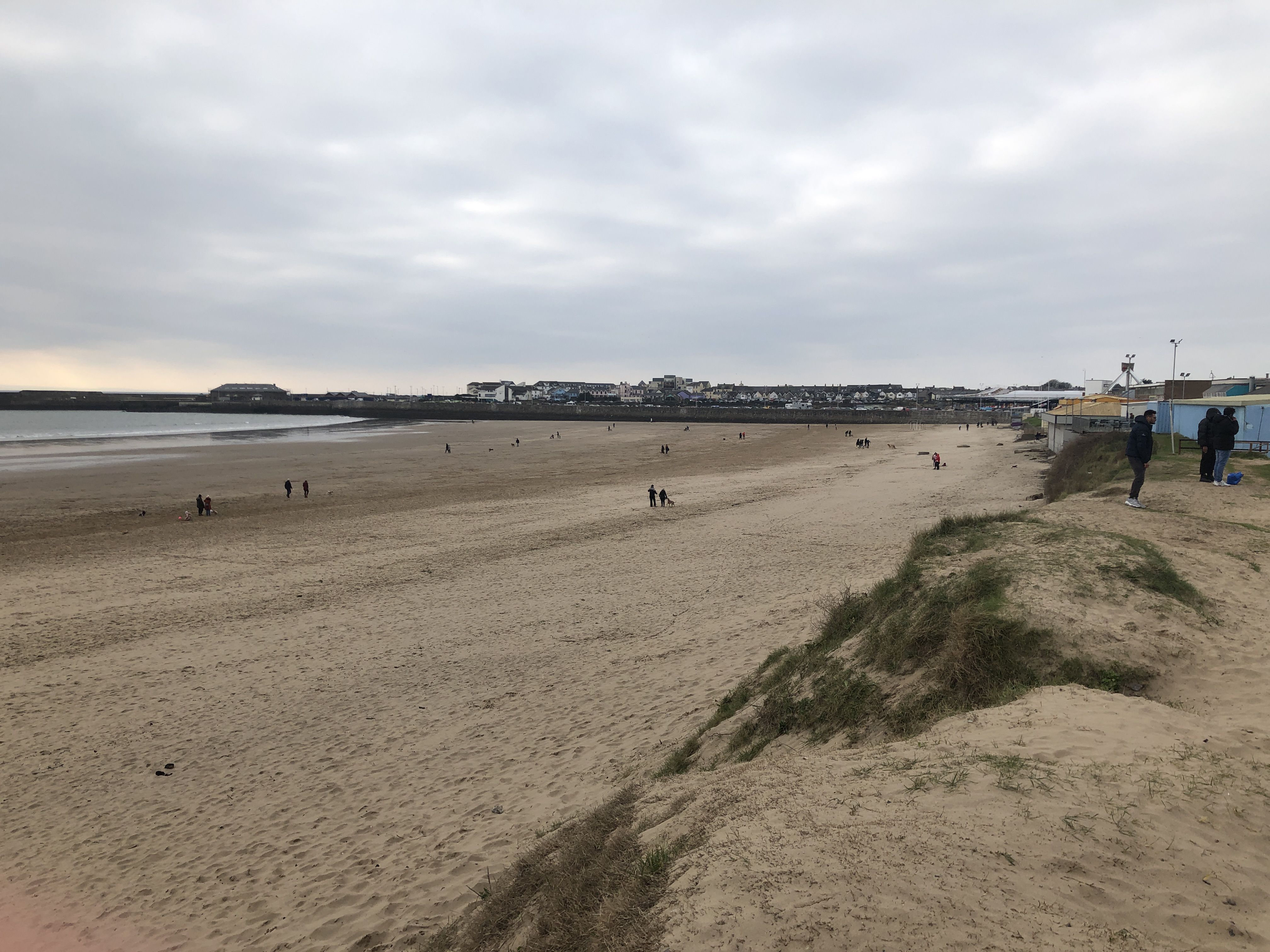
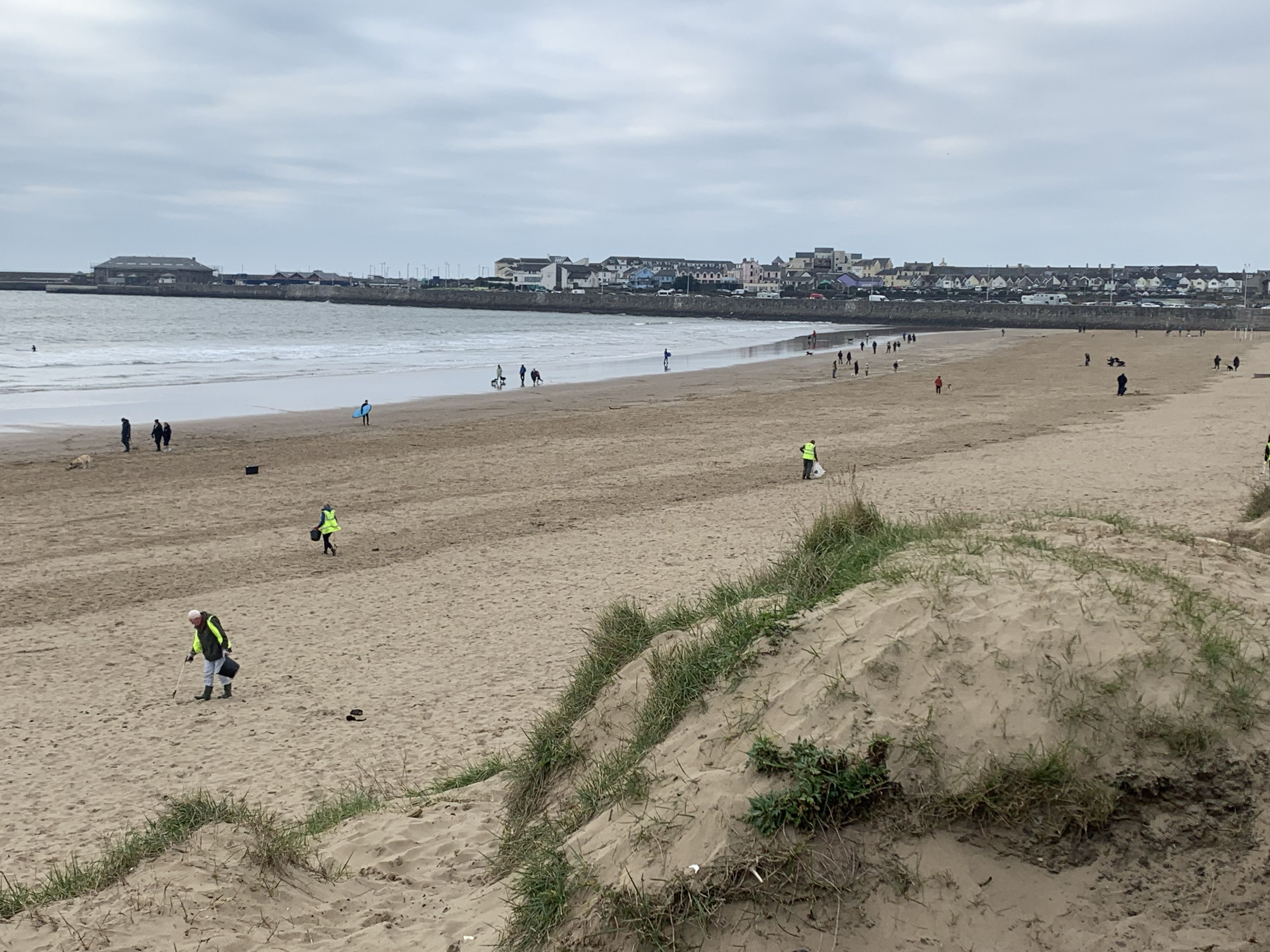
I am so engrossed in combing the beach for any signs of plastic, that it’s only when I look up that I realise I’ve reached the end of the beach. I check my watch: it’s been almost an hour. Have I already found and picked up all the litter? (I overhear Elkz tell a volunteer that the beach hasn’t been this clean in ages.) This makes me feel so much better, knowing that these regular beach cleanups are making a difference. Being with people who care about the environment and want to do something to help, I find, really is a mood booster.
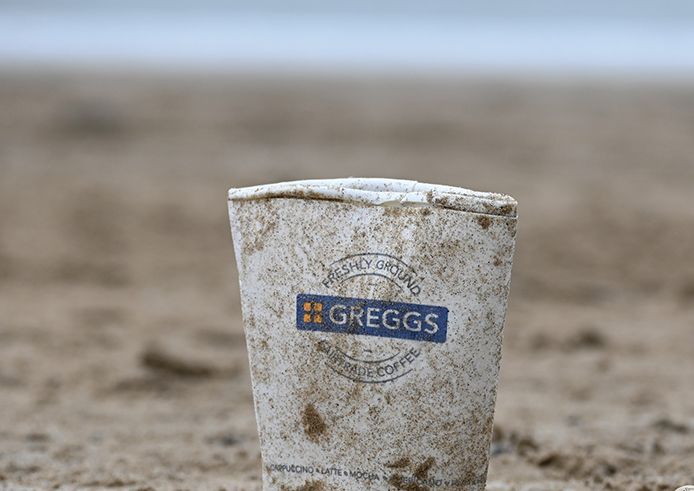
A paper coffee cup on Coney Beach. Credit: Mike "Elkz" Ellams
A paper coffee cup on Coney Beach. Credit: Mike "Elkz" Ellams
In fact, it’s heartening seeing non-volunteers helping out, too. People approach us and hand us any rubbish they stumbled upon. During the cleanup, a little girl, grandmother in tow, gallops towards Elkz and announces that she’s ready to help clean up. She apologises for their lateness and grabs a litter picker.
Being with people who care about the environment really is a mood booster
I begin to make my way back down the beach to pick up any litter that I may have missed the first time round – but I’m also looking for something else.
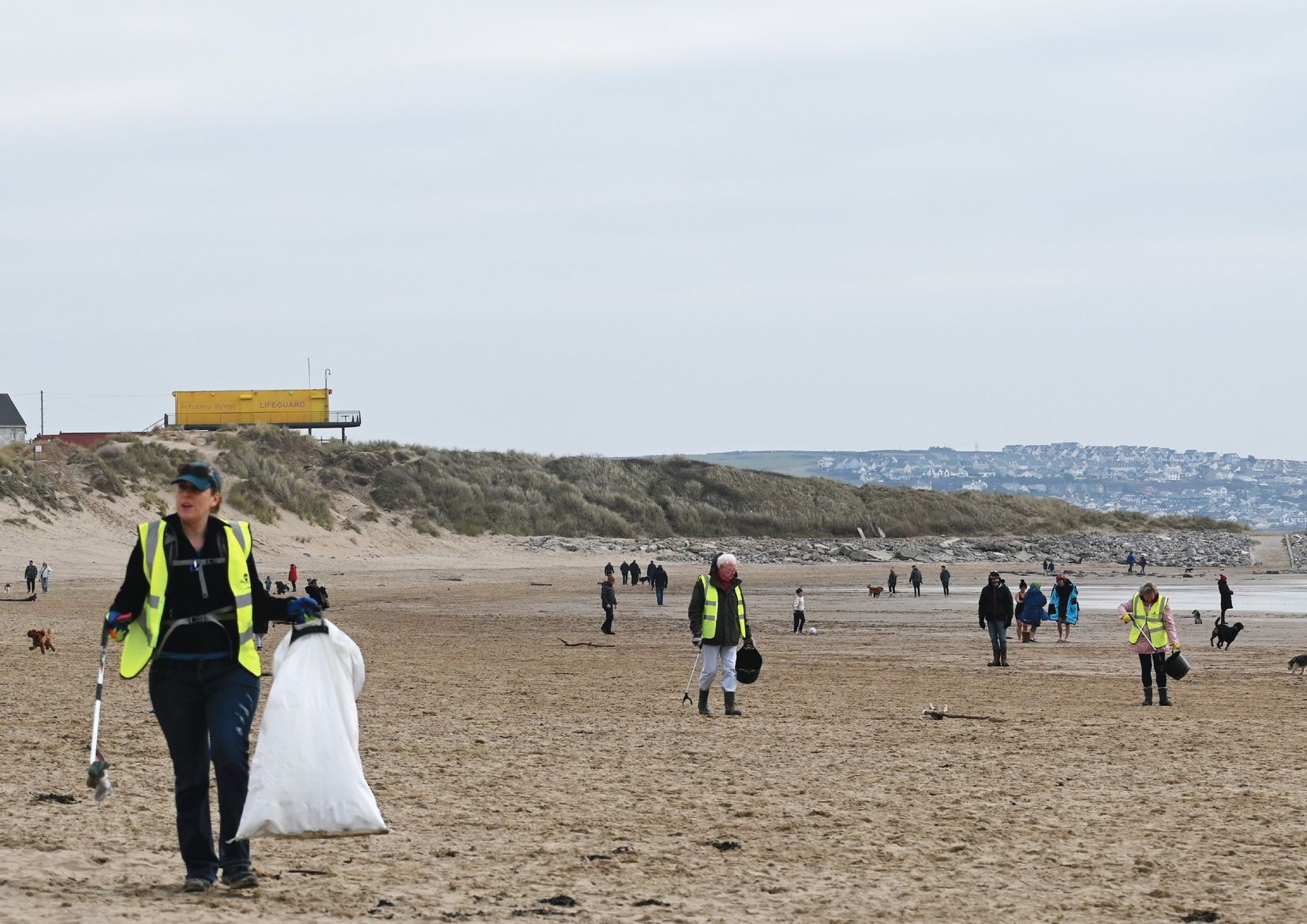
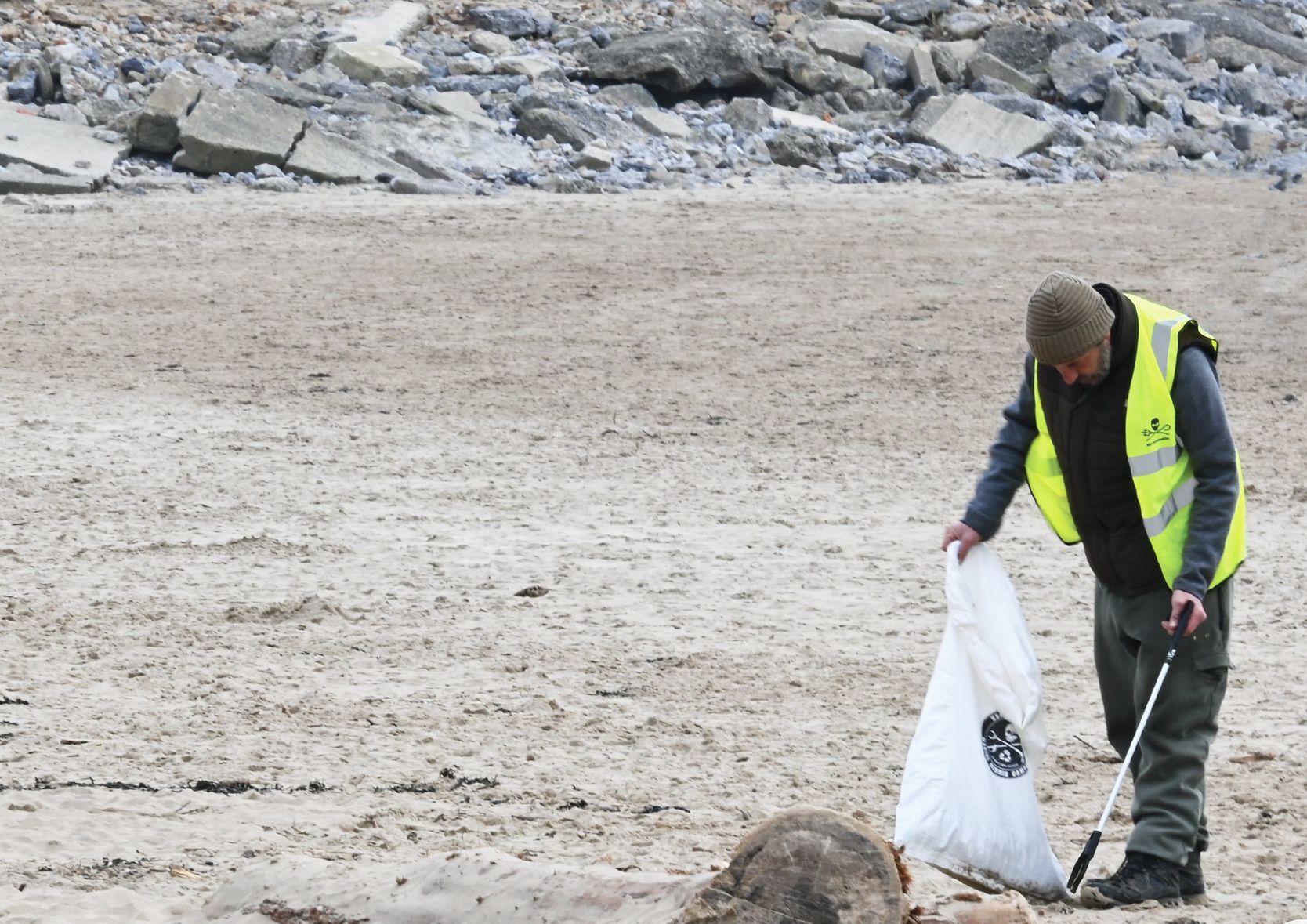
I hear somebody call my name. I turn around and see Lyn walking towards me, bag in hand filled to the top, and he asks me how I’m finding it so far.
I show him my bag, which is nowhere near as full as his and full of miniscule bits of plastic. He tells me I’m doing well and to give him a shout if I need anything.
“What were those egg case things that Elkz was holding?” I ask.
He explains to me that when sharks hatch, the case (or mermaid’s purse, as it’s more colloquially known) that keeps the egg safe is discarded and washes up on the shore. When volunteers collect these cases, Elkz rehydrates and photographs them and sends the photos to Shark Trust.
“This lets them know that the sharks are out there and thriving,” he says.
I ask him how I can find them and what they look like.
“You’ll know it when you see it.”
A couple of minutes later, I find one. Or so I think. I trudge across the sand to check with Elkz.
“That’s a lesser spotted catshark egg case,” he says within a nanosecond of seeing it. He places it in his cart for later. Feeling a sense of accomplishment, I have a new mission now – to scour the beach for more egg cases.

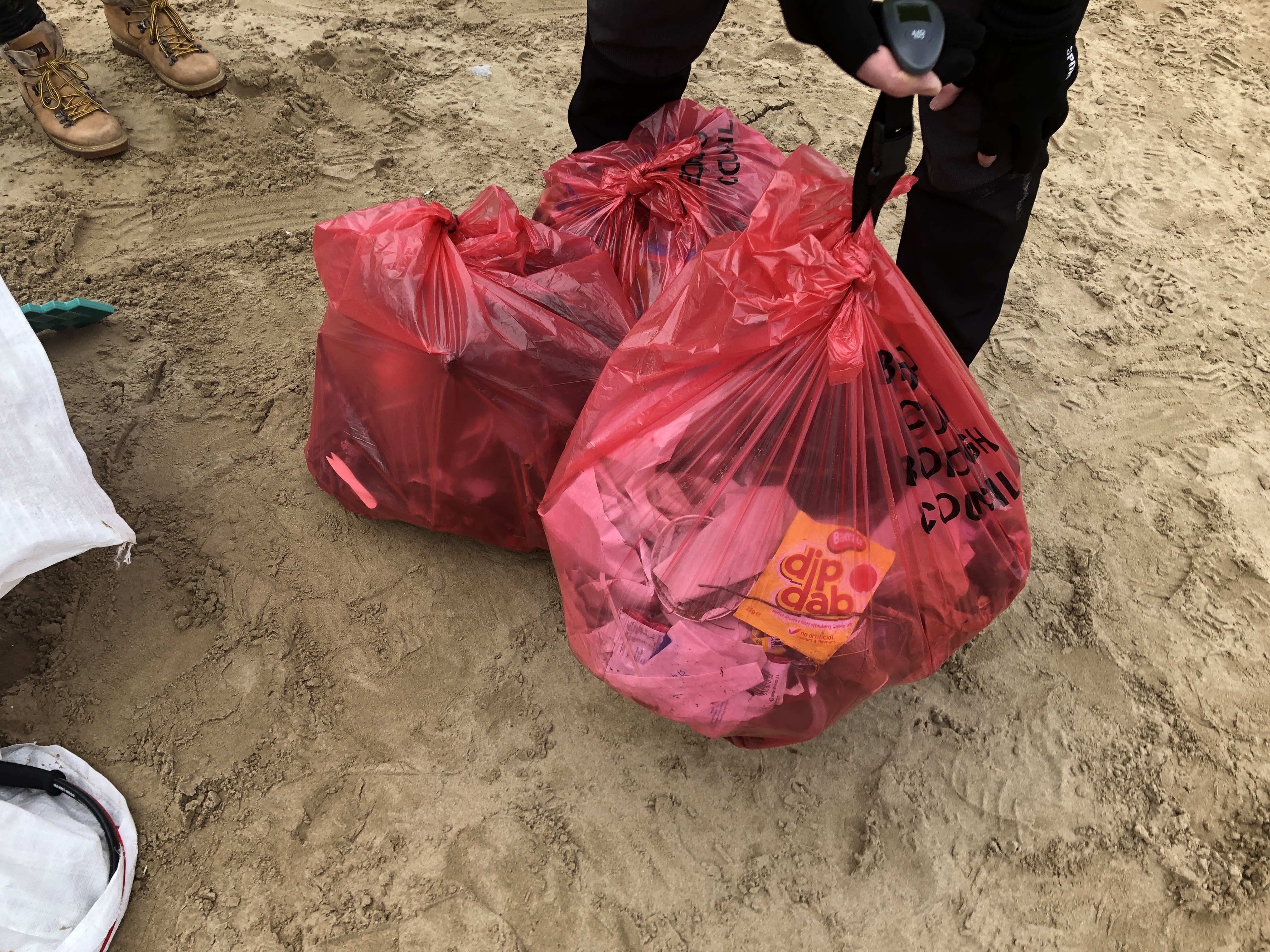
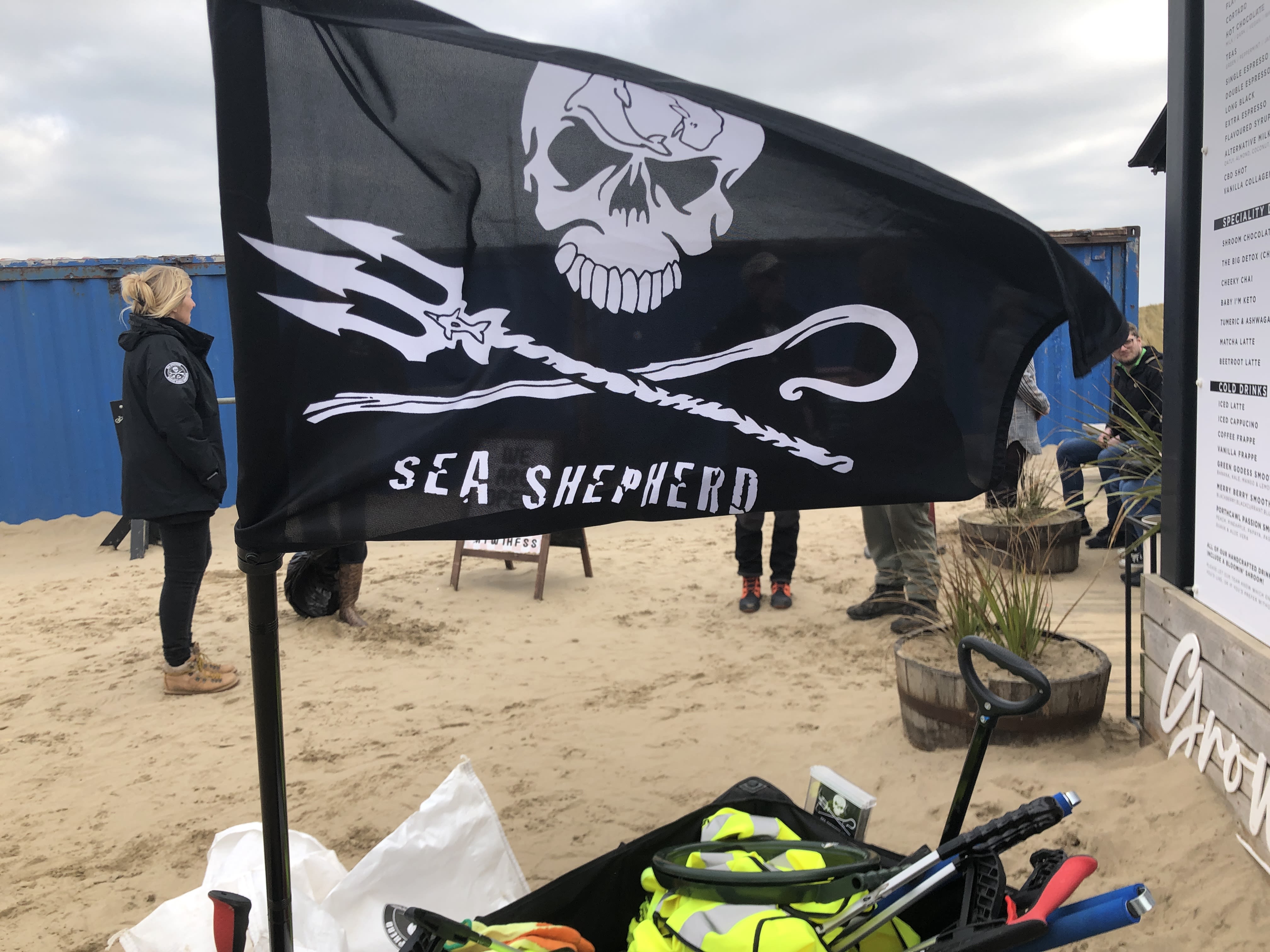
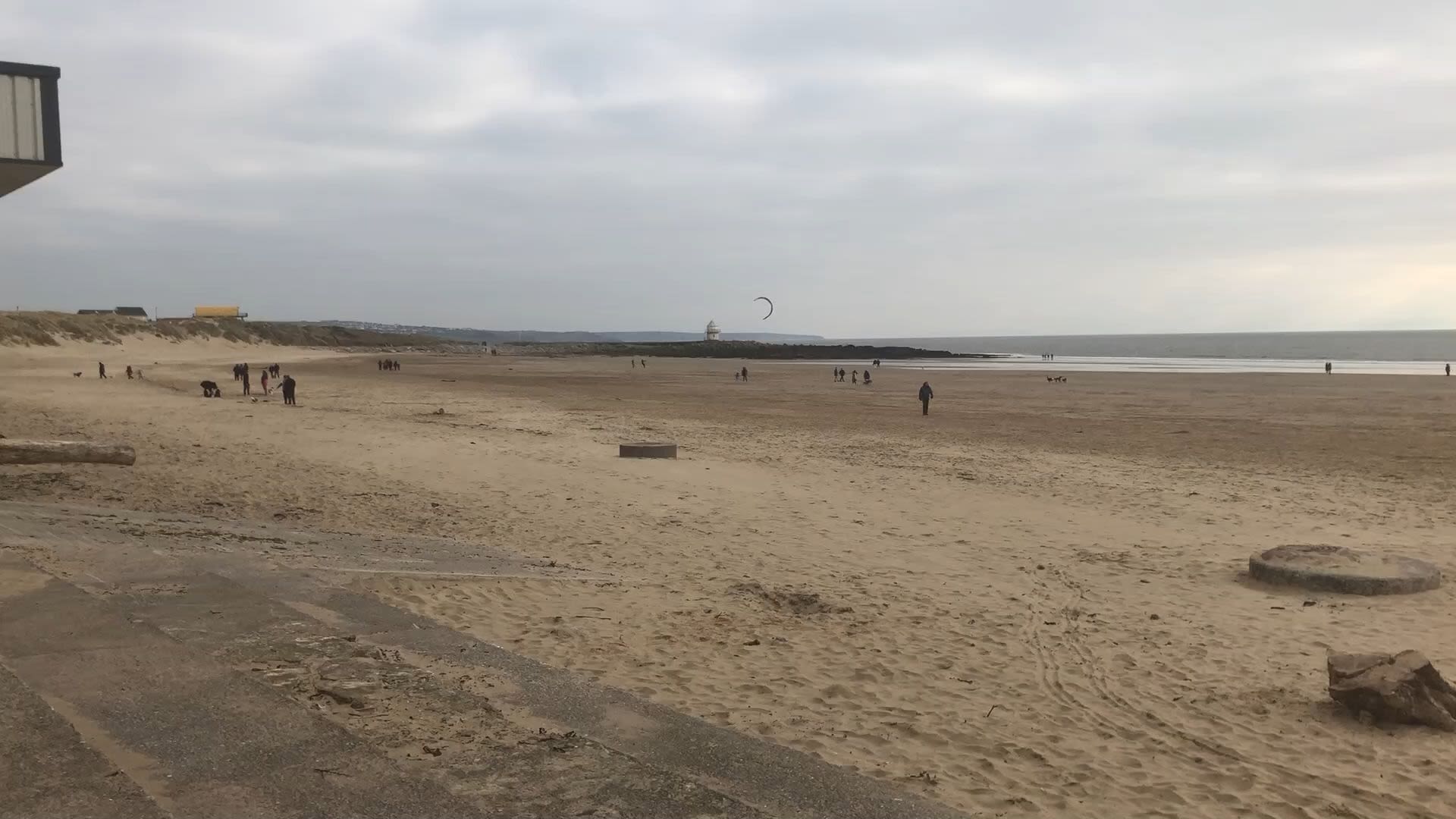

Just some of the waste we collected.
Just some of the waste we collected.

Sea Shepherd flag billowing proudly
Sea Shepherd flag billowing proudly
Great weather for flying a kite -- not the best for cleanups
Great weather for flying a kite -- not the best for cleanups
Our cleanup in numbers...
14 volunteers
36.5 kg of rubbish removed
2 hours of our time
18 egg cases found
In a way, it’s almost like the beach cleanup is tapping into my inner child. After all, I am on a literal egg hunt at a beach that I frequented as a child. Somehow, though, I feel different on this beach to how I did as a child. When a fluffy dog pants past after a tennis ball, I realise why.
Since early childhood, I have had a massive (some might say irrational) fear of dogs. There was many a time at this exact beach when my parents would become exasperated with me for flinching every time a dog came near me. If a dog hurtled towards me or jumped on me, even just to say hello, I would scream and run away towards the dunes. I could never enjoy myself, constantly glancing over my shoulder to check if any of the leadless dogs saw me as a target.
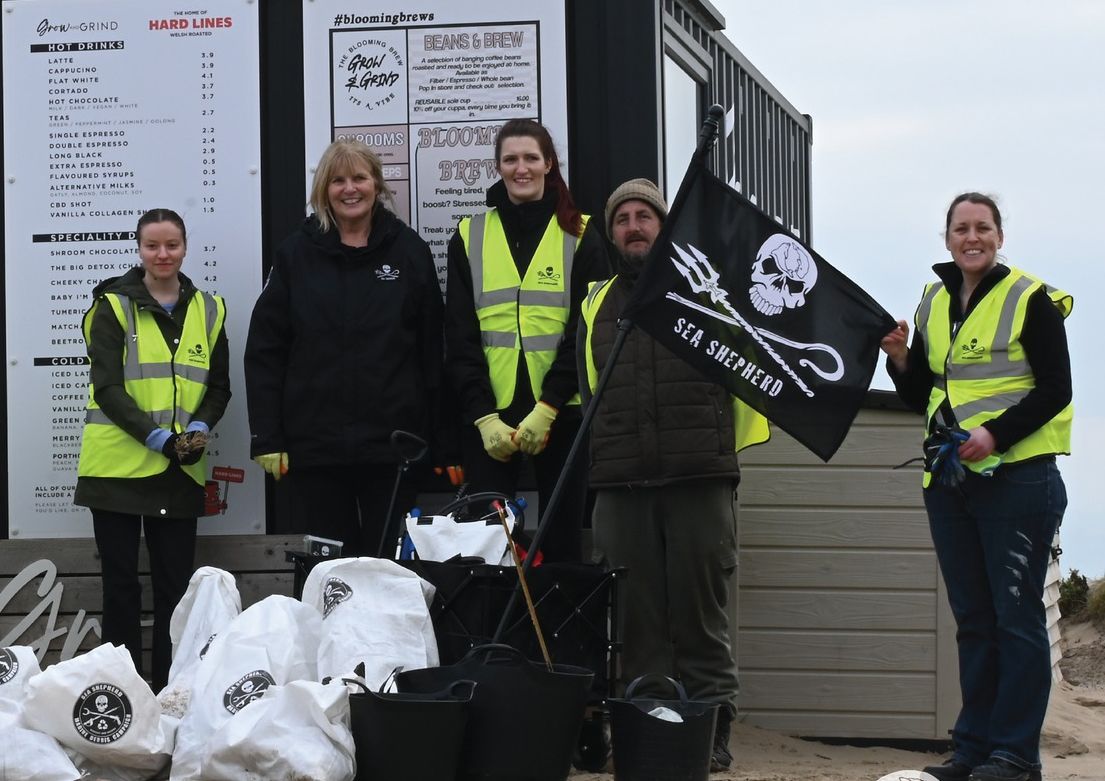
Five of the 14 volunteers. Credit: Mike "Elkz" Ellams
Five of the 14 volunteers. Credit: Mike "Elkz" Ellams
Now, though, I don’t even notice them, it’s just me, the beach, and all the litter and egg cases yet to be found. I feel very calm, and single-minded. The task distracts me from any worries I usually have.
I feel very calm and single-minded
In fact, the only time I feel anxious is when a worried man in a wetsuit asks me if I have seen a yellow bag that contained his clothes and keys. Fearing that somebody has stolen his possessions, he makes his way down the beach to ask other beachgoers if they saw anything suspicious. Crisis averted, though. As it turns out, the culprit was not an opportunistic thief, but an enthusiastic seven-year-old with a litter-picker and a bundle of energy. It seems our youngest volunteer had become overexcited and mistook the yellow bag for litter.
As I fill my bag with more egg cases than rubbish, Elkz calls us over. It’s the end. I glance at my watch; the two hours are already up.
The coast is clear
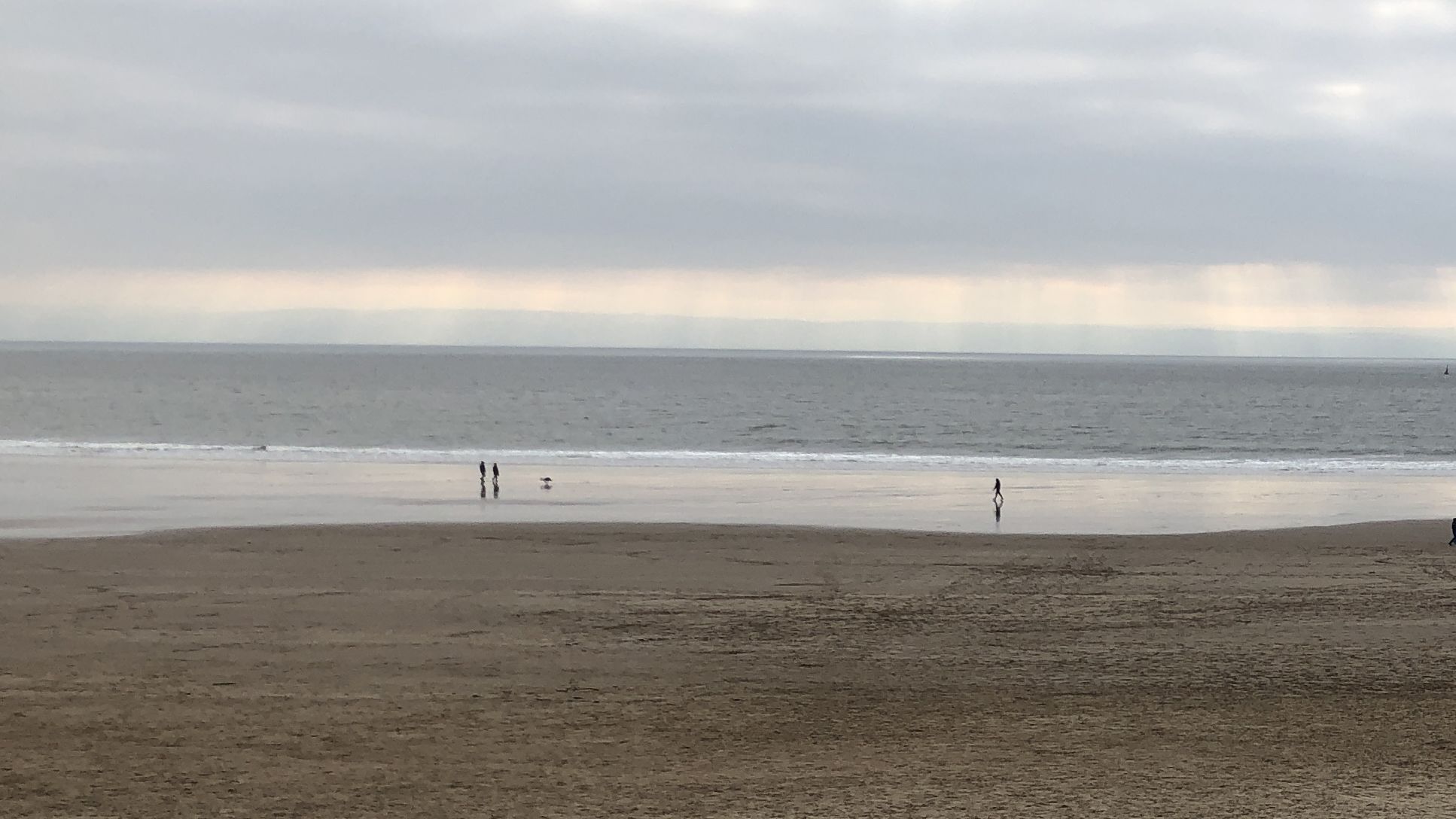
All volunteers head back towards the beach front café where we had congregated earlier. We hand back our vests and litter pickers and hand over our bags of rubbish. My bag is by far the least full, but I find myself not caring. In fact, I am pleased with what I achieved on a cold Sunday morning that I usually would have spent lazing around. I helped and that’s all that matters.
I show Elkz my bag of egg cases. He congratulates me and says he’s glad that I had fun. “Did you know that toasters kill more people than sharks do?” he adds.
“It’s therapeutic and sets you up for the day, so you can go home and relax.”
As I’m packing away my things, I notice that one of the volunteers is limping and has a black bag wrapped around her foot. “The mental health benefits of taking part in a beach clean overweigh any discomfort I have walking with that,” Cardiff-native Charlotte Eales tells me, gesturing towards her netball injury.
“It gives you a reason to get outside and be on the coast,” says the 26-year-old communications officer. “You’re doing a good thing and it’s nice to get out of your own head.”
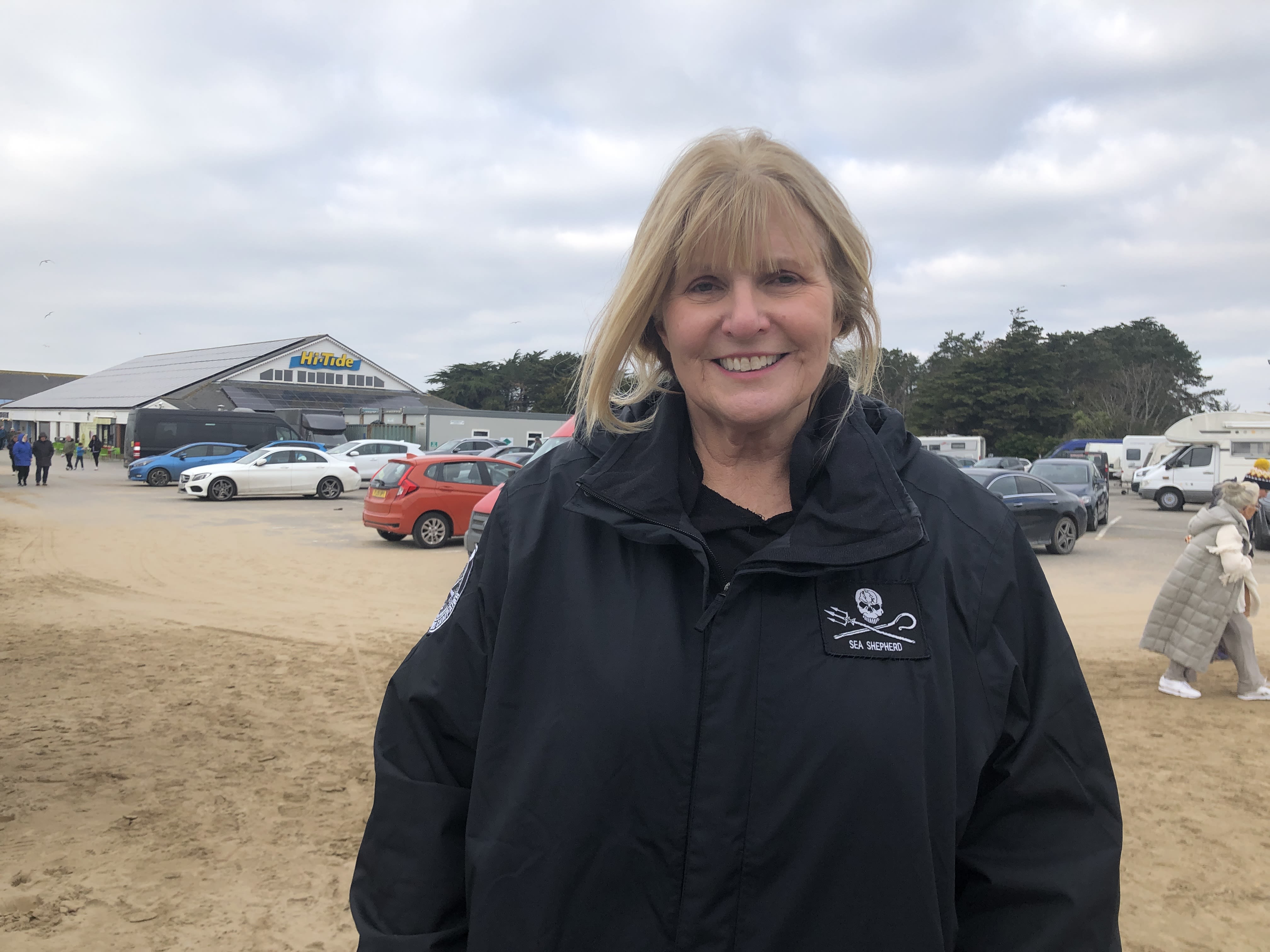
Julie Ellams regularly helps out
Julie Ellams regularly helps out
Her mother, Julie Ellams, also sees the mental health benefits of clean-ups, especially the community spirit. “You’ve got your little kids who are really excited and then you get the older volunteers – so it’s nice that all ages come together,” says the 58-year-old local government officer. “It’s therapeutic and sets you up for the day, so you can go home and relax.”
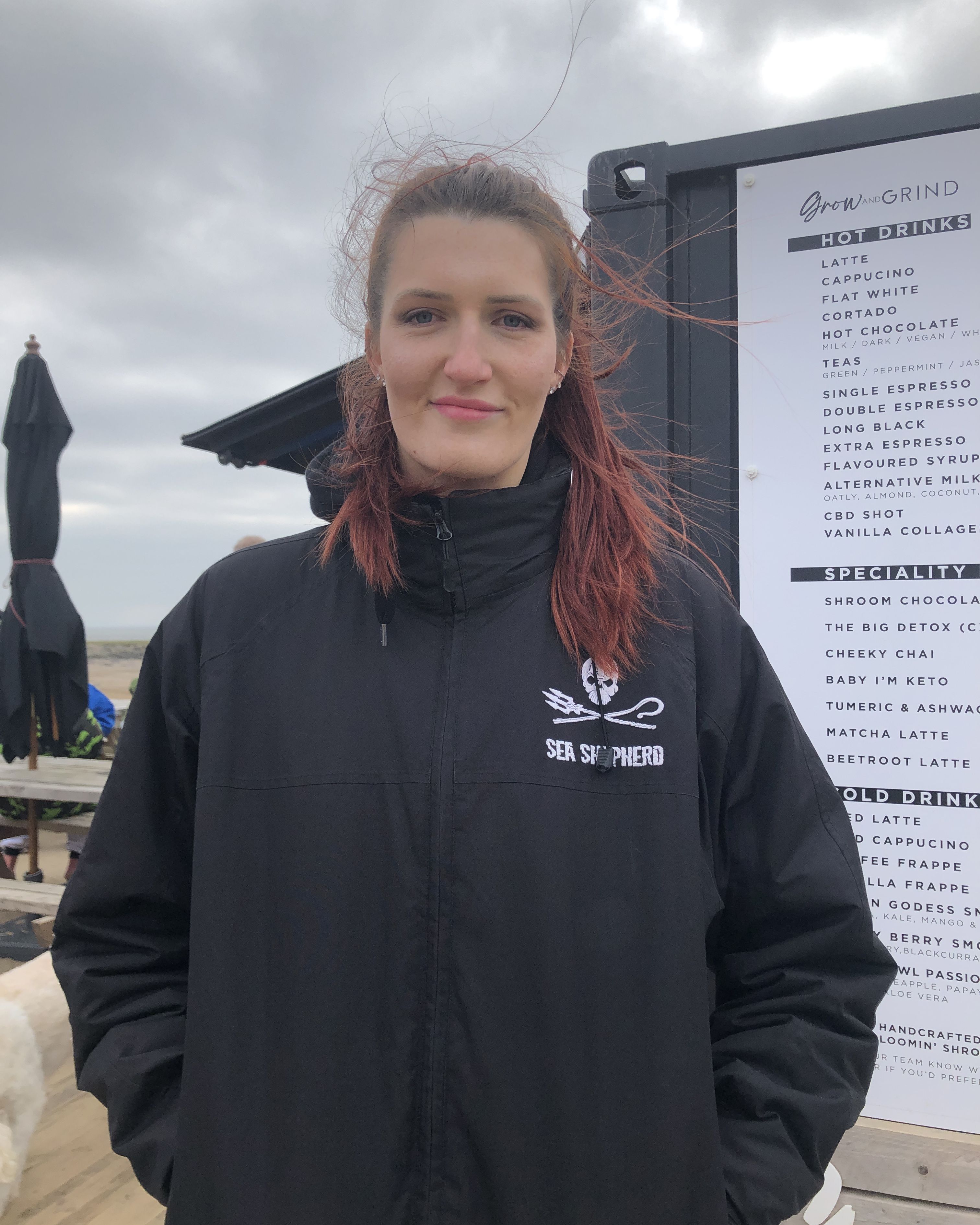
Charlotte Eales has been helping out since August 2022...
Charlotte Eales has been helping out since August 2022
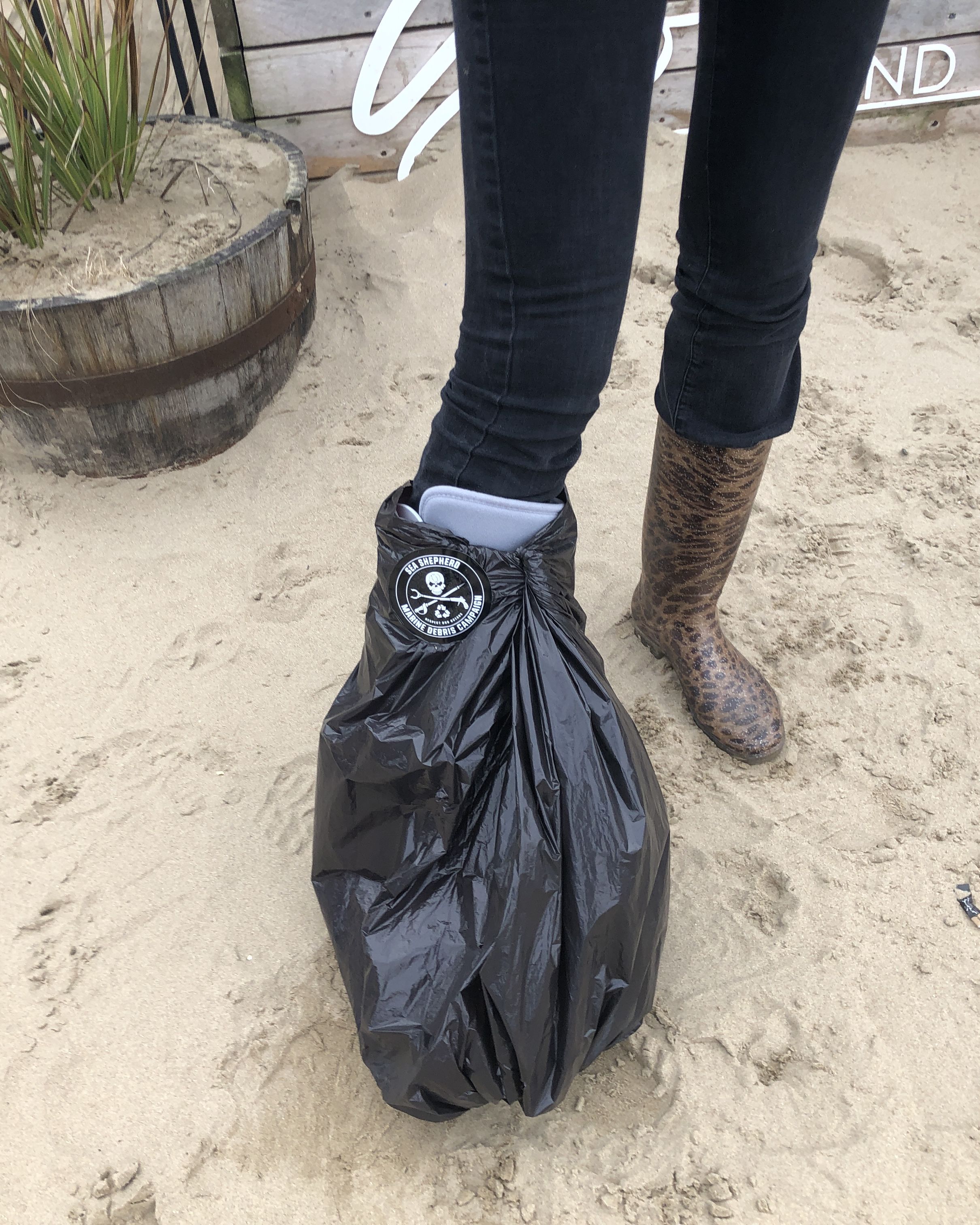
...and won't let her netball injury stop her
...and won't let her netball injury stop her
“You’re doing a good thing and it’s nice to get out of your own head”
– Charlotte Eales, volunteer
Julie is married to Elkz and the family have organised and participated in Sea Shepherd’s beach clean-ups since August 2022. Elkz, while not acting as a regional coordinator for Sea Shepherd, is a product designer. He says he first got involved with Sea Shepherd after a visit to Australia. He admits that what attracted him to the organisation was its logo. “First of all, I liked the skull,” he laughs.
However, after seeing the work the organisation does, he decided to join. He became the regional co-ordinator in south Wales to try to raise the organisation's profile in the country.
“They were looking to expand into Wales because the organisation is big in England but had never really taken off in Wales,” explains the 58-year-old Porthcawl native. “They asked me to get more volunteers on board, so I decided to build a presence on Facebook and let people know that we’re doing it regularly. The aim was to build up a brand and have people start getting used to us.”
The hard work seems to have paid off. Today, there have been 14 volunteers, but Charlotte tells me there were 44 volunteers at the previous cleanup.
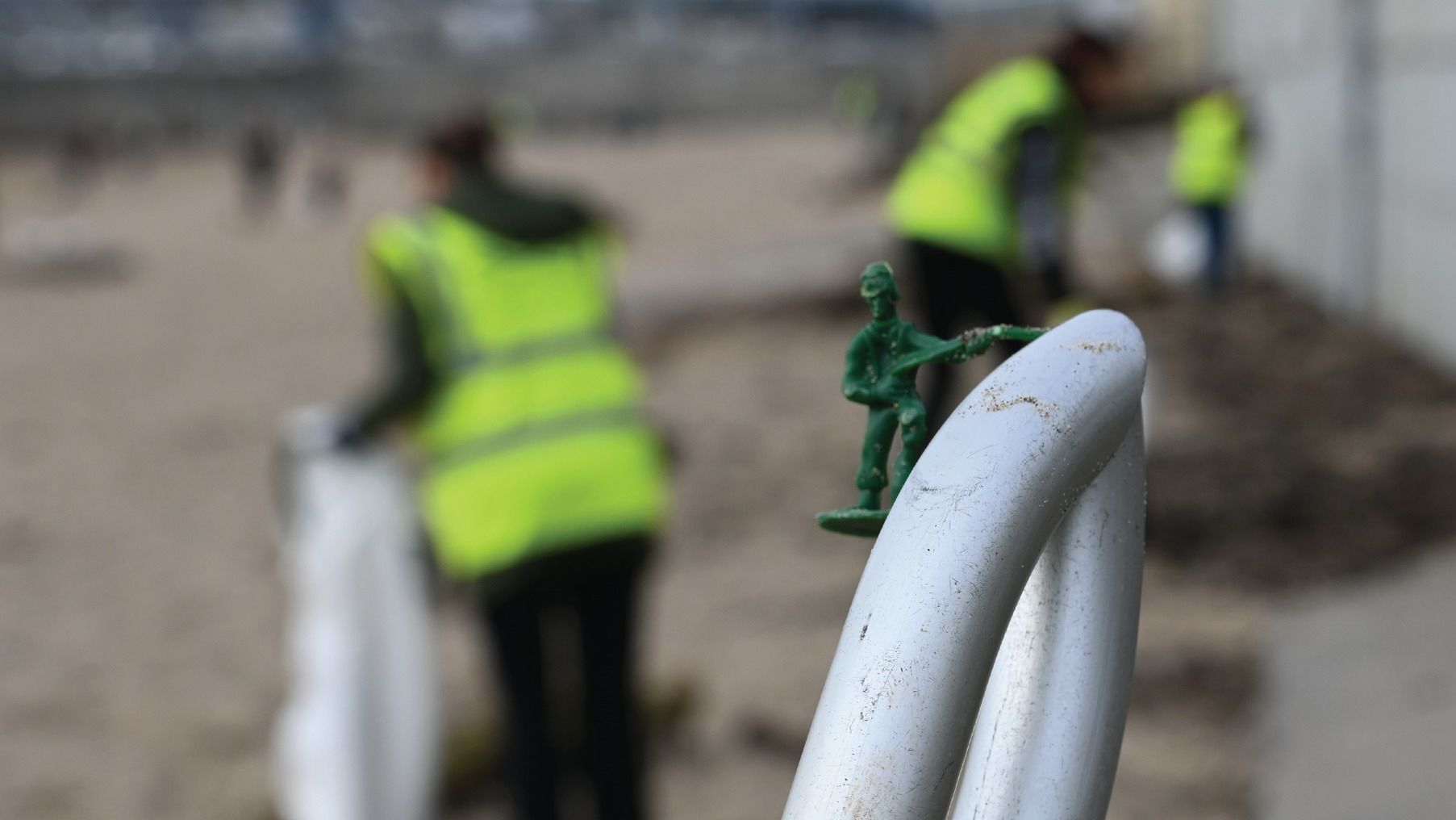
"It’s almost like meditation as you’re focusing on the smallest thing and not thinking about work"
– Mike "Elkz" Ellams, Sea Shepherd’s south Wales co-ordinator
But it’s a lot of time and effort to do this every fortnight. (Elkz tells me he’s also planning to start doing mid-week cleanups for those who can’t make the weekends.) What keeps him, and his family, going?
“Well firstly, it just makes you feel good because you stop everything you pick up from going in there,” he says, pointing to the grey sea in the distance. “But it’s also almost like meditation as you’re focusing on the smallest thing and not thinking about work. Plus, you’re meeting like-minded people with the same desire.”
When I return home and empty what seems to be a whole beach from my shoes into the backyard, I ruminate on the volunteers’ words.
While I am no longer at the beach, and I have returned to my world of responsibilities and mindless distractions, I do feel happiness and a sense of achievement. I don’t believe that participating in a beach clean for two hours has rid me of my worries any more than I believe that it has rid me of my life-long phobia of dogs. But I know that for those two hours, I escaped all my thoughts and cares to focus on nature. No phone, no distractions. Sometimes, two hours is all you really need.
